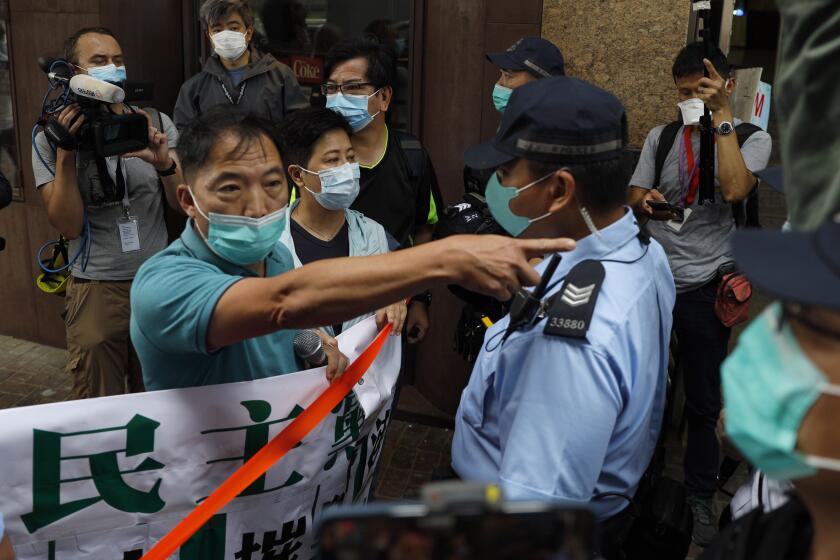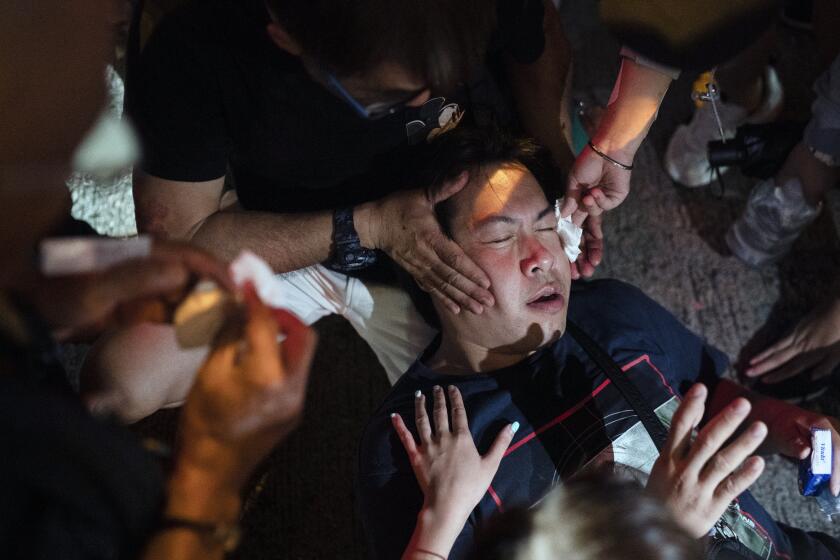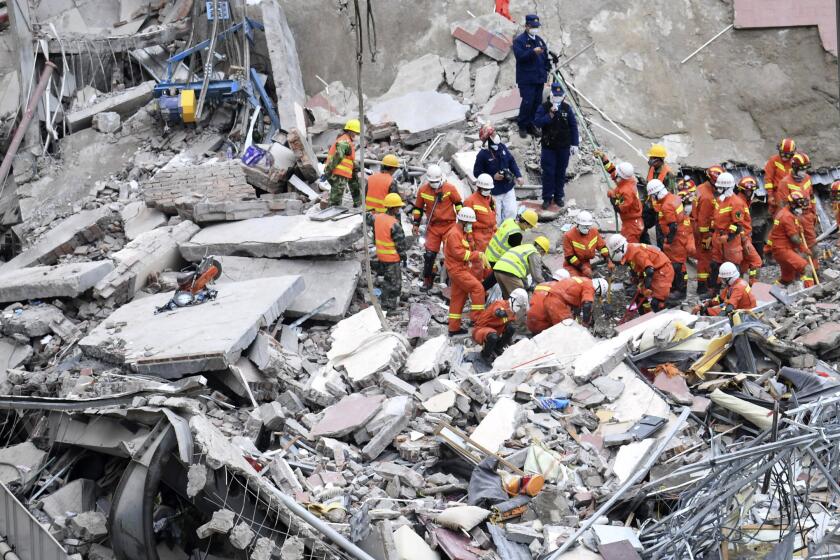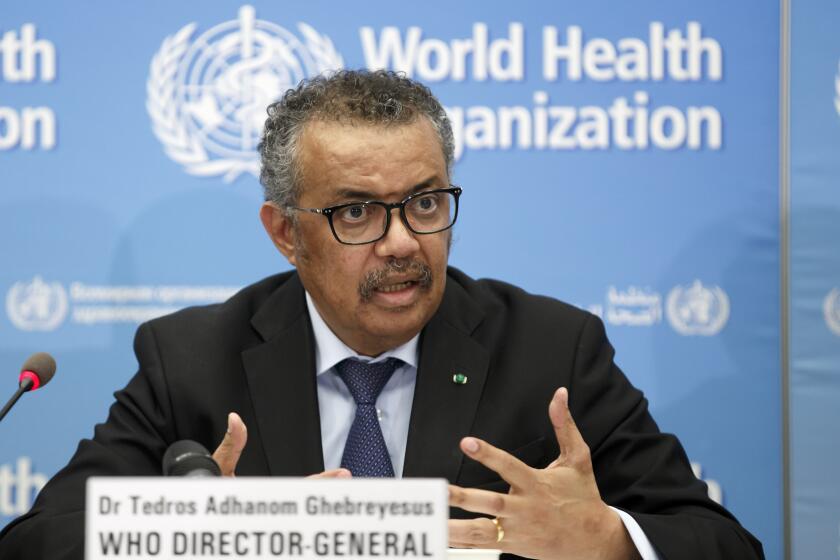Analysis: With a new law for Hong Kong, Beijing makes clear sovereignty is its bottom line
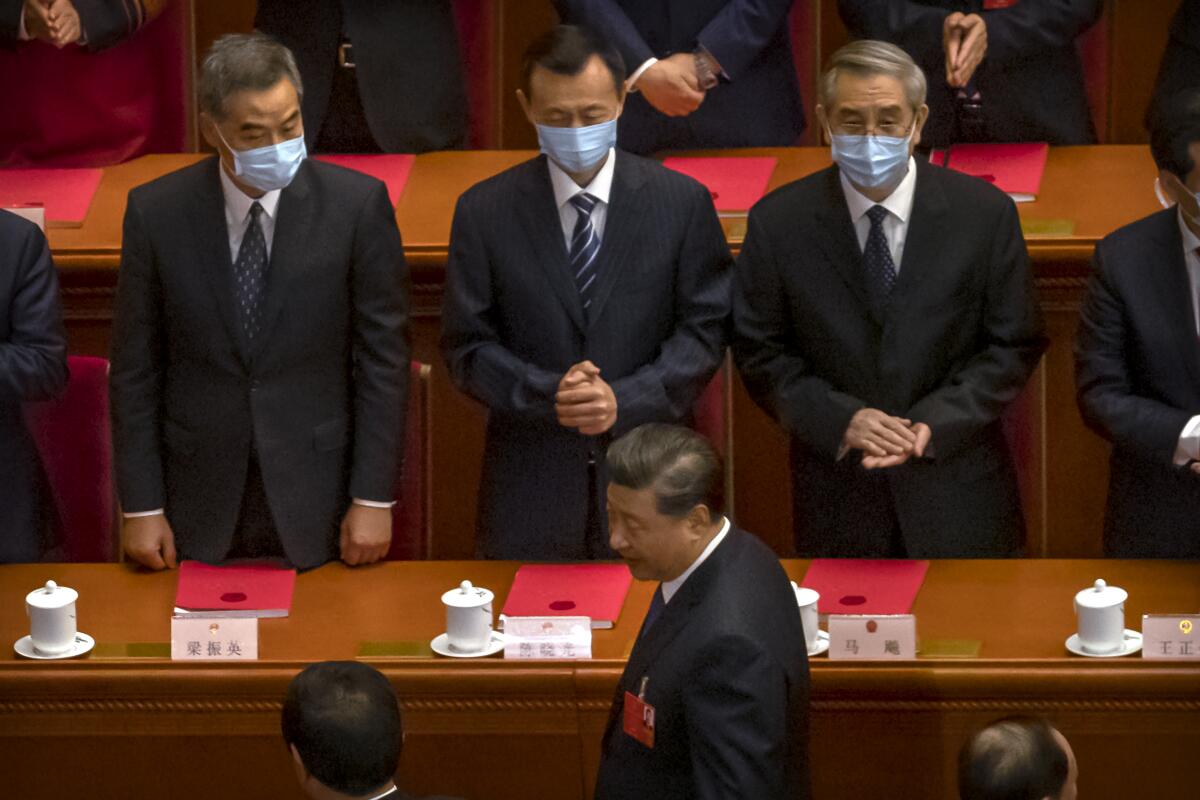
- Share via
SHANGHAI — The Chinese Communist Party and its leader, President Xi Jinping, emerged from their post-coronavirus political meetings this week with a clear message: Beijing’s bottom line is sovereignty, at any cost.
China’s rubber-stamp parliament Thursday approved a decision to impose a national security law on Hong Kong, bypassing the territory’s legislature in a move that sets the stage for both violence in Hong Kong’s streets and further conflict with the United States.
Multiple countries, including the U.S., Britain, Australia, Canada, Switzerland and Japan, had sent Beijing a flurry of warnings after the proposed law was announced last week at China’s most important annual political meetings. Not only would such legislation incite mass unrest by Hong Kong protesters resisting the encroachment on their rights; it would also violate “one country, two systems,” Beijing’s agreement to preserve the former British colony’s “high degree of autonomy” until 2047, foreign officials said.
Those warnings crescendoed Wednesday with U.S. Secretary of State Michael R. Pompeo’s announcement that the State Department no longer considered Hong Kong autonomous — opening the door for further action from Congress, including potential sanctions and cancellation of Hong Kong’s special financial, immigration and trade status.
But Beijing didn’t back down. Despite an economy reeling from the COVID-19 pandemic, international calls for an investigation into the coronavirus’ origins and an acknowledgment that China is facing “challenges like never before,” Xi and the ruling party have made clear that Hong Kong is their matter to deal with, and theirs alone.
Hong Kong is a “purely internal affair that allows no foreign interference,” Chinese Foreign Ministry spokesman Zhao Lijian declared at a recent news briefing.
Beijing’s move to tighten its grip on Hong Kong drew swift condemnation from U.S. officials as they weighed options for new sanctions.
Hong Kong’s protesters have a popular term for what’s happening: laam chau, literally “embrace” and “fry,” a metaphor for mutual destruction commonly translated as “If we burn, you burn with us.”
The idea was radical when pro-democracy protesters first used it last year to call for escalation in face-offs with the police. If Hong Kong had no hope of preserving autonomy peacefully, they reasoned, then Hong Kongers should drag China down with them in flames together.
Now laam chau is becoming a reality, analysts fear, accelerating each day as China and the U.S. stoke the flames of a conflict that looks set to explode in Hong Kong.
It’s a lose-lose situation for everyone, said Willy Lam, professor at the Center for China Studies at the Chinese University of Hong Kong.
Hong Kong leader Carrie Lam said seeking Chinese intervention was provided for under the constitution, but she hopes the government can resolve the crisis itself.
Under the new national security law, the people of Hong Kong would lose their freedom of expression, and foreigners, religious groups and civil society in Hong Kong would all be under threat, critics say. They scoff at the assertion of the city’s Beijing-backed leader, Carrie Lam, that freedoms will not be undermined.
For its part, the Chinese government could be hit by sanctions and a change in Hong Kong’s status as a separate customs territory. That would hurt China’s economy — as well as local and foreign businesses in Hong Kong — and reverberate across the globe, parts of which are already in a recession.
“Xi Jinping believes that he needs to impose total control over Hong Kong, just as he’s doing with Xinjiang and Tibet,” Lam said. “There might be some sacrifices to be made. But for him, he’s willing to pay the price.”
Three months ago, analysts wondered if the coronavirus would be Xi’s “Chernobyl moment,” as angry Chinese citizens cried for freedom of speech and accountability, infuriated by the government’s lack of transparency and thousands of COVID-19 deaths in Wuhan.
The coronavirus. A deadly building collapse. Political cover-ups. All poke holes in China’s desired image as a wealthy superpower poised to lead the world.
Yet Xi has emerged from that crisis even stronger than before. Domestic complaints have been contained through a combination of propaganda, force and the convenient example of worse failings to contain the virus in others countries.
Having successfully stabilized the domestic population, Xi has turned his sights to Hong Kong, where months of anti-China street protests last year roused Beijing’s ire. The Communist Party has made clear that it will spare no measures in bringing protesters under control.
State media have used rhetoric that hints at the policies Beijing imposed on Xinjiang and Tibet — concentration camps, forced labor and reeducation — and called Hong Kong’s protesters “terrorists,” demanding educational reform and couching the need to suppress them in “national security” wording.
Some of China’s actions have sparked a bipartisan U.S. response. Congress passed an act Wednesday to sanction Chinese government officials involved in the forced detention of Uighurs in Xinjiang. Dozens of Chinese tech companies also have been blacklisted for human rights violations.
Other U.S. actions against China have come more unilaterally from the Trump administration, including visa restrictions and the tech and trade wars.
Breaking News
Get breaking news, investigations, analysis and more signature journalism from the Los Angeles Times in your inbox.
You may occasionally receive promotional content from the Los Angeles Times.
“Some political forces in the U.S. are taking China-U.S. relations hostage and pushing our countries to the brink of a ‘new Cold War’…. People with wisdom and foresight on both sides must step forward to stop it,” Chinese Foreign Minister Wang Yi said at a news briefing Monday.
At the same time, China would defend its “sovereignty and territorial integrity,” he said, as well as its authoritarian system.
“China has no intention to change, still less replace, the U.S. It’s time for the U.S. to give up its wishful thinking of changing China or stopping 1.4 billion people’s historic march toward modernization,” Wang said.
Meanwhile, in Hong Kong, the authorities’ crackdown on protests continues. On Wednesday, as legislators debated a bill that would criminalize insulting the Chinese national anthem, riot police arrested hundreds of civilians on the streets for unauthorized assembly. Most were young, some in school uniforms and coming home from their first day back to class.
China and critics like the U.S. do battle over narrative of coronavirus crisis
Benny Tai, a prominent legal scholar who was jailed last year for initiating a nonviolent civil disobedience campaign in 2014 and later released on bail, wrote an op-ed in local media in April predicting that laam chau could take two years or more. It would happen, he said, through the disqualification of Hong Kong’s legislators, election interference from Beijing, vetoing of the budget and, ultimately, a national security law that led to street fights, bloody suppression and Western sanctions on the Communist Party.
Now it appears that Beijing has skipped straight to the endgame, he wrote on Facebook this week.
“Perhaps the CCP [Chinese Communist Party] thought the post-pandemic world was pushing it into a final struggle; perhaps they thought that slow pain might as well be exchanged for quick pain, or perhaps they believe China can withstand the great pain that will come,” Tai wrote.
“No matter what, the CCP has already pushed itself, Hong Kong and China to the edge of a cliff,” he said. “It’s truly the CCP that is speeding up laam chau.”
More to Read
Sign up for Essential California
The most important California stories and recommendations in your inbox every morning.
You may occasionally receive promotional content from the Los Angeles Times.
